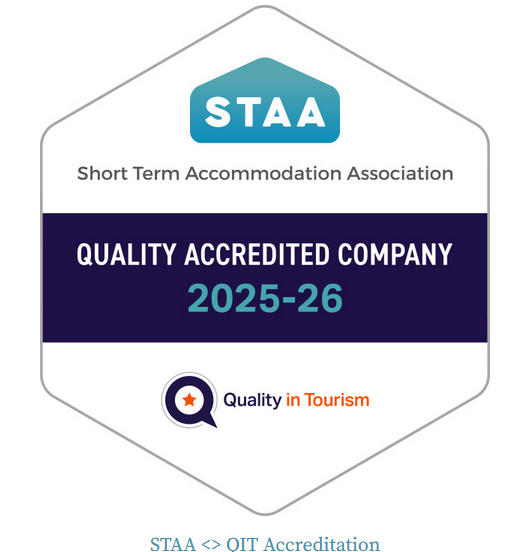Article Written By: by Paris Achen | Hosting and Management, Property Care, Short-Term Rental Regulation, STR Advocacy 101
When Merilee Karr co-founded the Short Term Accommodation Association (STAA) in the UK in 2017, she kept hearing the same frustrating refrain from government leaders and traditional hospitality groups: short-term rentals had no standards. Never mind the growing ranks of professional operators or the increasing list of safety regulations already on the books. The narrative persisted, and it was hurting the industry’s credibility.
“It used to drive me crazy when they’d say there are no standards in your industry,” Merilee recalled, “because A, there are a bunch of regulations that do apply to our industry, but B, there are also a lot of companies in the industry who are absolutely driving very high standards.”
Rather than fighting the perception through debate, Merilee and STAA decided to do something bigger – launch a third-party accreditation program that would meet the hospitality sector where it already was, with high standards backed by industry expertise and neutral third-party verification.
“We wanted to have an independent, third party, which was not the association…because otherwise you end up in a conflict of interest that the association is marking its own members, and you don’t want to score them down because they’re going to get angry.”
STAA explored partnerships with three accreditation providers before choosing Quality in Tourism (QiT), a UK-based accreditation body with decades of experience evaluating hotels and hospitality providers, including through the VisitEngland program.
Together, STAA and QiT created the Safe, Clean, and Legal short-term rental accreditation designed to reflect the professionalism, safety, and quality already present in much of the industry but often invisible to policymakers and consumers.
Unlike self-certifications, which Merilee said often amount to checking your homework, this accreditation involves in-person inspections by QiT, which evaluate properties on everything from health and safety compliance to cleanliness, guest communications, and operational processes. The accreditation criteria vary according to the jurisdiction, but at minimum, applicants could be required to provide documentation of public liability insurance, employers liability insurance, risk assessments, fire safety measures such as PAT testing or electrical installation checks, Gas Safe certificate, Wholesome Water Report, site license, planning permission, local legislative requirements such as boarding permits or operating certificates, and other compliance records.
What surprised Merilee was how much overlap there was between STRs and hotels when it came to accreditation criteria.
“To my surprise, it was 95% the same,” Merilee said.
The unique aspect of accrediting vacation rentals is judging whether a property is a three-star, four-star, or five-star, which requires more subjectivity than assessing hotels.
Today, any STR property in the UK can seek accreditation from QiT. Operators must complete an online application form, pay the fee, and upload copies of their required documents to their dedicated QiT member portal. A QiT assessor will then visit the property to assess whether it meets the standards of the Safe, Clean, and Legal accreditation. The fee starts at 99 British pounds ($134) but varies depending on the number of properties in the portfolio. For larger agency-level accreditation (Quality Accredited Company or QAC), prices start at 1,200 British pounds ($1,626).
More than 15,000 individual properties hold an STR accreditation from QiT. The number is likely much higher, given that the QAC accreditation is for property agencies. QiT doesn’t have a definitive figure for how many properties each of these agencies represents, as it changes constantly, but some have thousands of properties in their books, said QiT COO Ruth Robinson.
Once approved, hosts and operators receive a badge they can display on their websites, listings, and marketing materials to signal quality, safety, and trust to potential guests.

The badge became a lifeline and a lever for growth when the COVID-19 pandemic shut down most of the tourism economy.
Thanks to its independently verified standards, the STR industry in the UK was able to make a case for reopening a whole month before hotels. Operators who could demonstrate compliance through accreditation were allowed to open their doors to guests, while hotels remained shuttered.
That accreditation also opened another door: the UK’s National Health Service (NHS) urgently needed places to house frontline workers during the early months of the pandemic. With hotel space limited, professional STR operators across the UK stepped in, donating more than 20 million British pounds ($25.7 million) in free stays through a program called NHS Homes.
“Our frustration at that time was, well, the government was paying the Holiday Inn and different people to house NHS workers, and they weren’t paying our sector,” Merilee recounted.
NHS officials told the STAA they couldn’t pay for STR bookings because the industry had no standards, Merilee recounted. In fact, the STAA did have standards through the accreditation program, but not all short-term rentals in the NHS Homes program had accreditation.
The STAA and Crown Commercial Service (the UK Government procurement arm) negotiated an arrangement in which the NHS would buy stays in short-term rentals, provided that only accredited properties were offered through the NHS Homes program.
“We were able to…have one contracting party with the government, and we could bring everyone in under the association who was accredited to be able to sell it to government for the first time,” Merilee explained.
Trusted Stays became the distribution network for accredited STR operators in the UK to contract directly with the government. Operators who achieved accreditation could list their properties on Trusted Stays, which distributed inventory to government agencies and major travel management companies via the Global Distribution System (GDS), a platform that centralizes travel services like flights, lodging, and car rentals in one place so that travel agents can quickly compare prices. This was the first time accredited short-term rentals became accessible for government bookings, corporate stays, and business travel at scale. Suddenly, companies like Amex Travel, a travel agency for American Express clients, and CWT (formerly Carlson Wagonlit Travel), a major corporate travel agency, could now see and book vacation rentals just like they would a hotel. It also made STR listings accessible to companies that handle their own travel planning and send out requests for proposals to choose preferred accommodations for their employees.
“We put that accreditation in the photos on any of the platforms where we operate,” Merilee said. “It is something that we get feedback from customers that they value.”
Looking ahead, Merilee believes accreditation will be central to the evolution of short-term rentals. As more jurisdictions seek to regulate the industry, having a credible, independently verified badge can help distinguish between professional operators and bad amateurs.
“Accreditation is a great way to [ensure compliance] without…having to have a whole body of inspectors,” Merilee said. “It’s also then industry-funded. So, you don’t need to raise money to pay for government to be doing inspections when actually industry goes out and does it themselves.”
For operators, accreditation helps them stay in compliance and constantly improve their business
“Accreditation is more like an inexpensive consultant coming, looking at your portfolio, looking at your processes, and saying, look, if you can improve here, here, and here, we’ll accredit you,” Merilee said.
She has embraced that approach as CEO of UnderTheDoormat Group and Veeve, both of which have maintained accreditation at all of their properties since 2017.
“I’ve always appreciated accreditation, especially as an owner of a business,” she said. “It’s an external third party who are telling my team how they can get better, and that is invaluable.” This is many of the reasons why its so important to make sure that you get your property Verified, Trusted, and Accredited.






